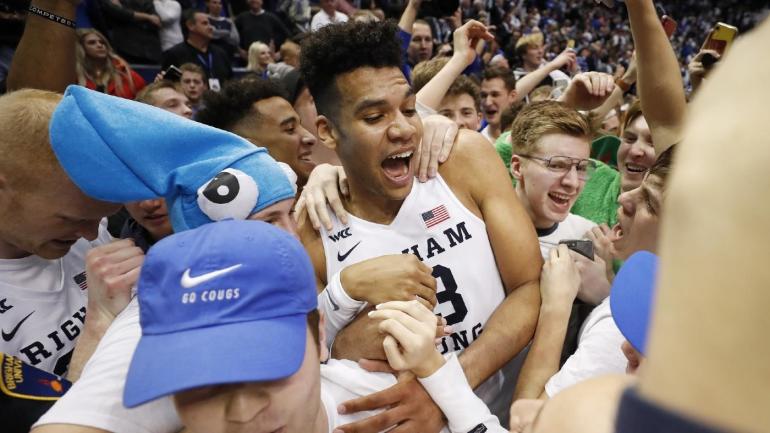

Now that we know college basketball will start on Nov. 25, we can turn our attention to what it will actually look like. It’s unlikely that a COVID-19 vaccine will be widely available by then, but perhaps testing advancements will be in place that can allow the sport to avoid the disruptions that have plagued the beginning of college football season.
If not, the complications that stem from contract-tracing could begin to wreak havoc on the hopes of the sport staging a somewhat normal nonconference slate that includes multi-team events. Speaking of testing, will lower-tier programs and leagues be able to afford the thousands of tests that will likely be necessary to complete a season? A potential lack of uniformity in health regulations is one reason why there is chatter about some power conferences staging league-only seasons. It’s been recommended by the NCAA Tournament committee that teams play a minimum of four nonconference games. But that’s not a requirement.
So will some conferences wind up taking a reclusive route and punt on nonconference games altogether? We’ll see. It’s one possibility that our writers weighed as they responded to the prompt for this week’s dribble handoff: “How successful will the college basketball season be?”
Matt Norlander
OK, so we’ve got our start date. Dan Gavitt told me Wednesday that it’s an “aspirational” goal. We also discussed the inherent challenges this season will bring, including the certainty — not likelihood, certainty — that college basketball will face a rash of delays and postponements just the way college football has. That sport has far fewer games but we’ve already seen more than a dozen matchups affected in the first three weekends of play. So let’s calibrate our expectations for college hoops and understand that it’s going to be a situation where we lose games on a weekly basis.
The question is how many.
And if the season can truly start Nov. 25.
I remain optimistic on that front. I think we’re going to get there, but as Gavitt noted, if the testing affordability and availability is not as such a point come November where most of the small-conference schools can afford it, we could have the season pushed back. The maximum number of games is 27. The minimum allowed for eligibility for the NCAA Tournament is 13. So here’s my level of expectation: I don’t think we’ll see one team play 27 regular season games. There are 357 Division I teams, and my estimate is that the average team plays 21 or 22 games next season. And to be clear, that’s the objective and hope and goal for college basketball’s powers-that-be as well. By no means is anyone thinking that most teams are going to complete their schedules. Nonconference scheduling in and of itself is already a quagmire. But I do think we’ll have a season and that it will start on Nov. 25 with some patchwork efforts. League play should be much more reliable — and flexible — and I’ll throw one more guess out here: in a normal college basketball season we have about 2,000 nonconference games. In 2020-21, I’m setting the over/under at 1,000.
Kyle Boone
I expect this season will be moderately successful in terms of how it will be conducted and how many fits and starts it may go through. It won’t be an impenetrable season virus-free like the NBA‘s bubble — I expect some disruptions along the way — but I also don’t think it will crash to a screeching halt and meet the same fate as last year’s college basketball season. Even if there are disruptions, postponements and cancellations, it won’t entirely derail the season. As we’ve already seen with college football, those who test positive are quarantined, contact tracing is conducted, and a lengthy process is enacted to ensure outbreaks are kept to a minimum. And because it is on a much smaller scale, college hoops has a chance to be far more successful, I’d argue, than college football. Games played will vary dependent upon outbreaks, but if the maximum is 27 and the minimum is 13, I’d handicap it right in the middle and say, on average, teams will play about 20 games this season.
David Cobb
College basketball can hobble through a disjointed schedule and make it through OK as long as the NCAA Tournament goes well. Given how much is as stake with this year’s tournament from a financial standpoint, you can bet it will be a well-done event — with or without fans. If anything, the potential lack of uniformity during the regular season will make the Big Dance even more unpredictable, which will make it especially memorable.
The NCAA Tournament selection committee’s job will be especially perilous, however, as the nonconference slate could devolve into a disjointed mess. But if that happens, it doesn’t necessarily mean the sport will be in a crisis. Sports fans will be distracted by college football, the NFL, an NBA season that is starting later than usual and the aftermath of a presidential election that is sure to bring controversy. So as long as the powerful conferences are able to regroup and play normal-ish league slates — and they should be able to with testing advancements — and the other leagues can at least hold conference tournaments to determine who receives at-large bids, the NCAA Tournament should proceed with some degree of normalcy. If a champion is crowned and One Shining Moment is played after a 64 or 68-team NCAA Tournament, that will mean college basketball staged a successful 2020-21 season.






